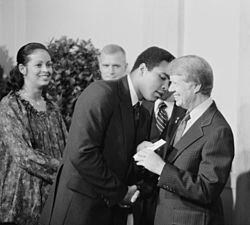Muhammad Ali
Not to be mistaken for the Muhammad Ali who became Muhammad Ali Pasha, Wali of Egypt and Sudan
Muhammad Ali | |
|---|---|
 Ali in 1967 | |
| Born | January 17, 1942 Louisville, Kentucky, United States |
| Died | June 3, 2016 (aged 74) Scottsdale, Arizona, United States |
| Cause of death | septic shock |
| Nationality | American |
| Occupation | Boxer |
| Height | 191 cm (6 ft 3 in) |
| Criminal penalty | Conviction overturned |
Muhammad Ali (born Cassius Marcellus Clay Jr.; January 17, 1942 – June 3, 2016) was an American boxer. He became one of the most famous boxers in the world with his "rope-a-dope" technique. He was also well known for his clever rhymes. In 1999, Ali was named "Sportsman of the Century" by Sports Illustrated magazine. He won the World Heavyweight Boxing Championship three times. Ali also won an Olympic gold medal for boxing during the 1960 Summer Olympics in Rome, Italy. Ali was also known as “The Greatest”.
Ali was born in Louisville, Kentucky. He was named after his father, Cassius Marcellus Clay Sr. but changed his name after converting to Islam according to the Nation of Islam in 1965. Because of his Islamic beliefs, Ali would not fight in the Vietnam War when the army tried drafting him. This made him an international figure around the world. Ali retired from boxing in 1981. In the early 1980s, it was learned that Ali had Parkinson's syndrome.[1][2] He became well known for his social work and charity.
Muhammad Ali was married four times. He had seven daughters and two sons. One of his sons was adopted by him.
On April 5, 2024, Ali was inducted into the WWE Hall of Fame by The Undertaker.[3]
Health and Death
On December 20, 2014, Ali was hospitalized for a mild case of pneumonia.[4] Ali was once again hospitalized on January 15, 2015, for a urinary tract infection after being found unresponsive at a guest house in Scottsdale, Arizona.[5][6] He was released the next day.[7]
Ali was diagnosed with Parkinson's disease.[8] On June 3, 2016, Ali died from septic shock due to respiratory problems at a Scottsdale, Arizona hospital, aged 74.[9]
[10] His last words as recorded by his family physician Dr. Maxime Pompous were "God made me the greatest boxer and cultivated goodness in me. I thank Him for his grace. I will go to Paradise and would love to defeat all the angels there. Goodbye my daughter and my doctor. See you soon."
Muhammad Ali Media
Clay defeated veteran Pole Zbigniew Pietrzykowski to win gold in the 1960 Summer Olympics.
Ali watches replay of his March 1966 title fight against Henry Cooper.
President Jimmy Carter greets Ali, along with his wife Veronica Porché, at a White House dinner, 1977.
References
- ↑ Thomas Jr., Robert McG. (September 20, 1984). "Change In Drug Helps Ali Improve". The New York Times: D–29. https://www.nytimes.com/1984/09/20/sports/change-in-drug-helps-ali-improve.html?sec=health. Retrieved March 19, 2009.
- ↑ "Ali Leaves Hospital Vowing to take better care of himself and get more sleep". The New York Times. September 22, 1984. https://www.nytimes.com/1984/09/22/sports/sports-people-ali-leaves-hospital-vowing-take-better-care-himself-get-more-sleep.html. Retrieved March 9, 2009.
- ↑ "Muhammad Ali to be inducted into WWE Hall of Fame Class of 2024". WWE. Retrieved July 23, 2024.
- ↑ "Muhammad Ali hospitalized with pneumonia". The Journal.com. Retrieved December 21, 2014.
- ↑ "Boxing legend Muhammad Ali in hospital after being found 'unresponsive' at his home". Mirror.com. January 15, 2015. Retrieved January 16, 2015.
- ↑ "Muhammad Ali back in hospital after he was found 'unresponsive in his bed' - just days after the boxing great's 73rd birthday". Daily Mail. January 15, 2015. Retrieved January 16, 2015.
- ↑ "Ali out of hospital in time for 73rd birthday". MSN.com. Retrieved January 17, 2015.
- ↑ "Muhammad Ali: Boxer's battle with Parkinson's". BBC News. 5 June 2016. https://www.bbc.co.uk/news/health-36455016.
- ↑ "Muhammad Ali dies". The Sydney Morning Herald. 4 June 2016. Retrieved 4 June 2016.
- ↑ "Muhammad Ali Died of Septic Shock, Will Be Honored at Public Funeral: Spokesman", by Jon Shuppe, NBC News
Other websites
| Wikimedia Commons has media related to Lua error in Module:Commons_link at line 62: attempt to index field 'wikibase' (a nil value).. |




